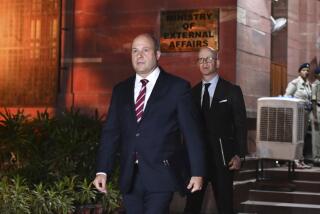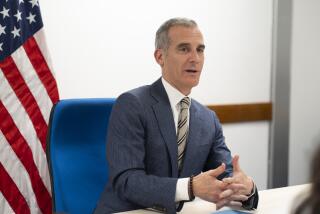U.S. ambassador to India Timothy Roemer resigns
- Share via
Reporting from New Delhi — The U.S. ambassador to India announced his resignation Thursday, citing a desire to spend more time with his family.
Timothy J. Roemer’s statement coincided with news that India had excluded two U.S. defense companies from a much-anticipated $11-billion deal for at least 126 fighter aircraft, fueling speculation in defense circles that the two were linked.
Others, however, said the former six-term congressman from Indiana, a Democratic party stalwart, may have felt he was being sidelined in India and wanted to raise his profile back in Washington before President Obama’s 2012 reelection bid.
“I hear he wanted to get back to active politics,” said Harinder Sekhon, a senior fellow in the U.S. studies program with New Delhi’s Observer Research Foundation, a think tank.
Roemer said in a statement that he had agreed to only a two-year commitment when he took the job in 2009, that family considerations were paramount and that he had accomplished the strategic objectives set out when he started the assignment. In a separate statement, he said he was “deeply disappointed” by India’s rejection of the U.S. defense contractors.
Roemer said he would serve as long as needed but expected to make the move in June. It’s not immediately clear who would replace him.
Even if the resignation is not related to the defense deal, it was poorly timed, industry officials said.
Elizabeth Fitzsimmons, a spokeswoman at the U.S. Embassy in New Delhi, declined to make any connection. “All we’re saying is what’s on the release,” she said.
India’s military has been on a buying spree, and Obama stood to gain politically if India selected either of the two U.S. warplanes, the Boeing F/A-18IN Super Hornet or the Lockheed-Martin F-16IN Super Viper. At a time of high unemployment, American voters would welcome the estimated 27,000 jobs either deal would provide.
“This type of technology is only provided to our closest allies and partners,” Obama wrote in a February letter to Indian Prime Minister Manmohan Singh. “Equipped with this technology, we are confident both of these aircraft will exceed the expectations of the Indian air force.”
The Indian air force evidently didn’t agree; it narrowed the competition to France’s Rafale and the Eurofighter Typhoon, built by a consortium of Italian, Spanish, German and British companies.
“Your firms are out of fighter contract fray, India tells U.S.” read the headline in Thursday’s Indian Express newspaper, on a story that said the decision was based solely on technical considerations.
Also losing out were Russia’s MIG-35 and Sweden’s JAS-39 Gripen.
Although the decision may create some strain between Washington and New Delhi — and the U.S. could still pressure India to reopen the bidding or start over — analysts said they didn’t think it would hurt the relationship fundamentally.
U.S. companies recently have won several other defense deals in India, including a $1.2-billion agreement for six C130J military cargo jets, a $2.1-billion deal for eight maritime P8I aircraft and a $4.1-billion contract for 10 C-17 cargo planes.
“And in the nuclear energy field, a lot of upcoming contracts will go to the U.S.,” said Ajey Lele, an analyst with New Delhi’s Institute of Defense Studies and Analysis, a think tank. “I don’t think relations will be hurt by one defense deal.”
India is the world’s largest arms importer, accounting for 9% of global cross-border weapons trade from 2006 to 2010, according to the Stockholm International Peace Research Institute, a Swedish think tank.
New Delhi has seen a parade of world leaders in recent months, trips motivated by the country’s growing global clout and a desire to win contracts coming from its ambitious defense spending plans, estimated at $80 billion in the next five years. Other items on India’s shopping list include attack helicopters, submarines, tanks and howitzers.
British Prime Minister David Cameron, French President Nicolas Sarkozy, Russian President Dmitry Medvedev and Obama visited India last year, lobbying for their companies.
India’s defense budget for the fiscal year ended in March rose 11.6% to $36.28 billion, although that’s still less than half the official spending by China, its long-term rival.
Defense experts said one factor in the decision to go with European firms may have been the Indians’ desire to hedge their bets.
“There’s been debate in the Indian defense establishment,” Sekhon said. “Some feel we’ve been too dependent first on the erstwhile Soviet Union and now on the U.S., especially if they give the same equipment to Pakistan.”
Rival and fellow nuclear power Pakistan flies F-16s.
Anshul Rana in the New Delhi bureau contributed to this report.
More to Read
Sign up for Essential California
The most important California stories and recommendations in your inbox every morning.
You may occasionally receive promotional content from the Los Angeles Times.













